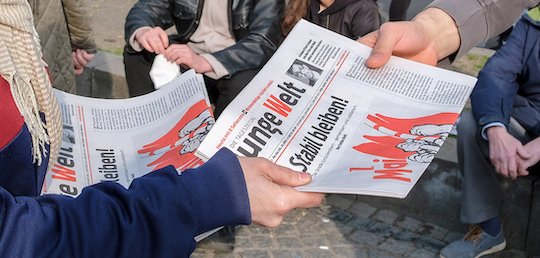Mrs. Clinton Goes to Berlin
While Julian Assange is fearing extradition, the former foreign minister is hailed as a promoter of peace and democracy
junge WeltArtikel-Länge: 16160 Zeichen
Uneingeschränkter Zugriff auf alle Inhalte: Erleben Sie die Tageszeitung junge Welt in gedruckter oder digitaler Form – oder beides kombiniert.
Nachrichtenauswahl und -aufbereitung erfordern finanzielle Unterstützung. Die junge Welt finanziert sich größtenteils durch Abonnements. Daher bitten wir alle regelmäßigen Leser unserer Artikel um ein Abonnement. Für Neueinsteiger empfehlen wir unser Online-Aktionsabo: Einen Monat lang die junge Welt als Onlineausgabe bereits am Vorabend auf jungewelt.de und als App für nur sechs Euro lesen. Das Abo endet automatisch, keine Kündigung erforderlich.
Dein Abo zählt!
Weitere Optionen unter: www.jungewelt.de/abo.
Abo abschließen
Gedruckt
Sechs mal die Woche: Hintergrund und Analysen, Kultur, Wissenschaft und Politik. Und Samstag acht Seiten extra.
Verschenken
Anderen eine Freude machen: Verschenken Sie jetzt ein Abonnement der Printausgabe.



